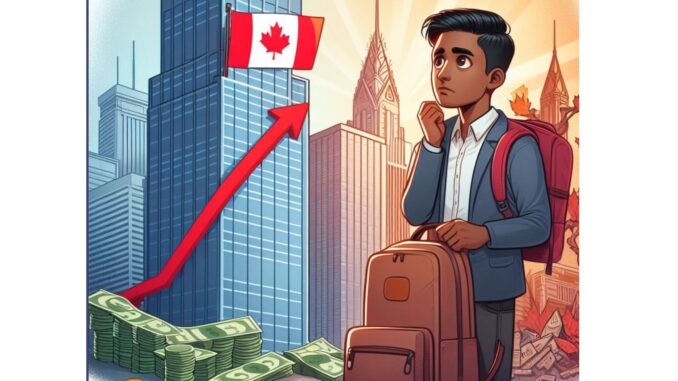
By Bhavya Gulati, Kianna Holland and Chloe Bernabei
As grocery, rent and transportation costs soar, international students find themselves often paying much more than in their home countries for necessities. With the added cost of tuition, and the inability to work many hours due to student schedules, this creates significant financial strain that makes living in Canada challenging for many.

Galvin Wong, an international student at Seneca Polytechnic in the Television Broadcasting program, came to Toronto to fulfill his dreams of making it as a filmmaker. Wong explained that in Hong Kong, where he is from, there isn’t a healthy film industry. That was the catalyst that motivated him to pick up his life and move to a foreign country. Wong added that his biggest challenges moving to Canada was the culture shock and high costs of living. Wong says that international students can’t own houses in Toronto, so they are forced to pay extremely high rent prices. On top of this, Wong pays $18,469 dollars in tuition fees for his program, which is triple the cost of domestic students.
Wong elaborated on the cost of living in Hong Kong. Everything costs less due to no sales tax, therefore goods are automatically at least 13% cheaper than in Ontario. According to Numbeo, any McMeal at McDonald’s in Toronto would cost $15 Canadian dollars, whereas it is $7.76 Canadian dollars in Hong Kong. The Canadian price is double that of Hong Kong.
Toronto: A Vibrant yet Expensive Hub
Toronto is referred as one of the most expensive cities in Canada to reside in. Mercer’s 2023 cost of living survey reveals that when compared to cities like Vancouver, Montreal, Ottawa and Calgary, Toronto officially remains at the top. It was also ranked as 90th most expensive city globally. Even though life here is expensive, it is still known as one of the most engaging cities globally, following Vancouver and Stockholm. The GTA experienced a massive increase in international student arrivals last year, nearly a million students came from foreign countries to study in Canada. Reasons behind the desire to move to Toronto include better career opportunities, economic opportunities, and the reputation of a good quality of living. Toronto consistently achieves international recognition, securing top positions on global liveability lists such as Mercer’s Quality of Living Report. In North America, Toronto takes the second spot, securing 17th place worldwide. The Economists global liveability index has placed Toronto 7th for the second time.
The rising costs of living means decreased standards of living for many international students. Coming to the country to achieve the “Canadian dream” is often turning more into a nightmare.
GIC or a Guaranteed Investment Certificate, is a prerequisite fee paid by international students in Canada, which has also been doubled. It has been increased by $10, 000 Canadian dollars to $20, 635 Canadian dollars. This change has impacted many international students who’s dream is to pursue studies in Canada. With increasing inflation, international students require more money to support yearly living expenses. GIC is valid for only one year, making it challenging to manage expenses beyond that period without a job.
The impact of inflation hits more than just the bank account. Economic hardship has affected the lifestyle of many international students, and has therefore negatively impacted mental health. According to a CBC news report, suicide rates of international students in Canada have skyrocketed . The report states that deaths of international students at a funeral home in Etobicoke had doubled in 2022 from 2021.
What measures are the government taking?

The federal government recently announced it is decreasing international student visas by 35%. Immigration Minister Marc Miller has addressed the struggles faced by international students, and believes that this move will help ease Canada’s housing and inflation crisis. However many international students see this action as a band-aid solution to a much bigger problem. One of these students is Akarshan Singh, the president of Seneca Polytechnic’s student federation SSF. Singh believes cutting down visas is not a well thought out decision, and that the focus needs to be on inflation as a whole.
“I would say the main problem , which needs to be addressed are chronic conditions that we are in and if [the] government addresses that there would be no need to put any sort of cap on anyone”. - Akarshan Singh
How is Seneca Student Federation helping international students?
Singh says that SSF has provided facilities like food banks and other food events to relieve economic strain on international students. Furthermore, they hire as many student staff as financially possible to give students career and income opportunities. Singh added that SSF hosts career fairs and seminars in resume building, job searching, and interview skills to help international students secure jobs.
Anticipating Resolution
The question now is will inflation and the rising costs of living get better or will international students need to opt out of choosing Toronto?
There are reasons to think that the prices of houses in Toronto might go down in the future. In 2022, inflation was so high that the Bank of Canada tried to reduce spending by making it more expensive to borrow money. The goal was to lower the demand for houses, however dealing with inflation and its impact on the economy could take long time. The Bank of Canada’s latest report reveals that the housing situation might not get back to normal until at least 2025.

Be the first to comment